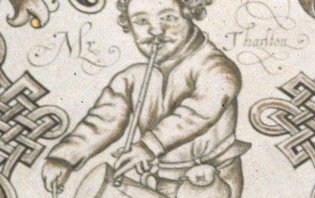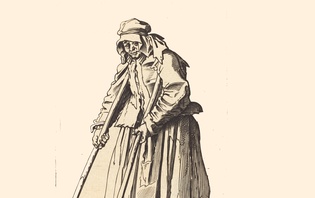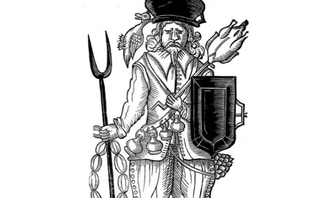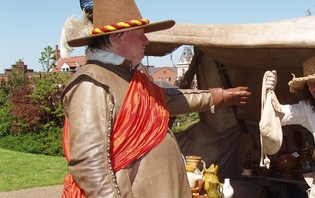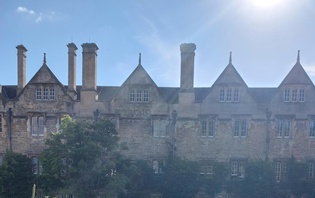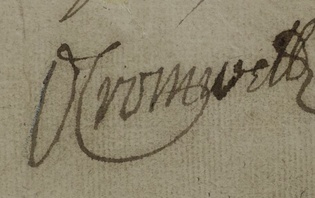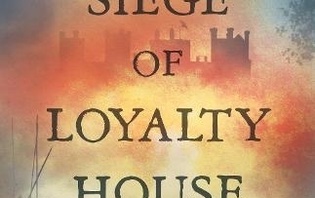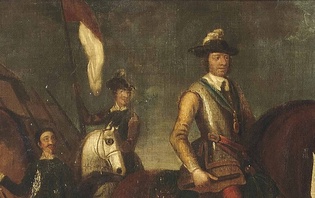The Scottish Connection
Over the duration of our project we aim to identify, digitise and transcribe literally thousands of petitions and other documents related with ex-soldiers and bereaved families from the Civil Wars. The project will focus on the counties and boroughs of seventeenth-century England and Wales (although we are already liaising with Irish and Scottish colleagues, with eye to future projects). Even in the heart of England, however, as David Appleby has found whilst researching Nottinghamshire, there is plenty of evidence to show that the so-called ‘First English Civil War’ of 1642-1646 was never solely an English affair…
When fighting broke out in England in 1642, both King and Parliament solicited the services of professional Scottish officers. A more formal intervention came in January 1644, when the Scottish Covenanters sent a large army over the border in support of their English co-religionists in Parliament. At first, parliamentarian commanders such as Fairfax and Cromwell cooperated well with the Covenanters led by the earl of Leven and General David Leslie. The two allies even formed a ‘Committee of Both Kingdoms’ to coordinate their mutual war effort against Charles I. Gradually, however, tensions emerged. With the rise of the Independents, and the corresponding eclipse of the pro-Scottish Presbyterian interest within Parliament, Scottish soldiers were made to feel less and less welcome. As parliamentarian subsidies dried up, Leven’s army was starved of money, ammunition and food, and forced to live off the land. Scottish commissioners accused the Independent faction within Parliament of withholding funds deliberately in order to make the Covenanter army unpopular with English civilian communities. Charles I clearly intended to exploit his enemies’ divisions when he delivered himself to Leven’s army then camped around Southwell, Nottinghamshire, in May 1646. In the event, the Covenanters used the king as a bargaining chip to prise £400,000 from Parliament. Having handed him over to their erstwhile English allies the Covenanters marched back to Scotland in February 1647. Many of the Scottish soldiers would return to fight in England in 1648 and 1651.
The impact of these political and military machinations on ordinary people’s lives can be seen in petitions such as that of a parliamentarian cavalry trooper named Joseph Curtis. Curtis’ petition to the Nottinghamshire authorities in 1647 detailed how, whilst he had been serving with Colonel Francis Thornhagh’s regiment, his home and possessions had been looted first by royalist enemies then by Scottish allies; the former causing him £100 in losses and the latter £53 9s, for which he received only five pounds by way of compensation (TNA, SP 28/241, fol. 1352). The Scottish Covenanters, meanwhile, lost many men dead and wounded in the fighting in Nottinghamshire, particularly whilst besieging the royalist stronghold of Newark. Several documents detail the expenses of nursing sick and wounded Scots in and around Nottingham (e.g. SP 28/241, fol. 84). Not all Scottish soldiers were able to leave when the Scottish army marched away from Southwell with their royal prisoner: the petition of one Nottinghamshire widow, Anne Nixon of Barthley, shows that as late as September 1646 she was still caring for a Covenanter named James Scott. Scott had been wounded months earlier, during the siege of Newark, and was still too ill to move. Just as Leven’s army had been starved of money by Parliament, so Widow Nixon was being forced to provide for the wounded man out of her own meagre funds. To its credit, the Parliamentary Committee for Nottinghamshire did belatedly allow her some financial relief (SP 28/241, fol. 722). Extra money was provided to enable James to journey north to re-join his army, as it had been for another Scottish soldier, Willy Scott, in May that year, who had ‘been long wounded here’ (SP 28/241, fol. 114).
Most poignant of all was the petition of William Moffett in October 1645. Moffett had come down with Leven’s army, but had somehow ended up under local English command, in the infantry company of Major Joseph Widmerpole. The petition details that having suffered a bad fall, his injuries had proved too complicated for the local surgeons, leaving Moffett ‘in danger to be a cripple so long as he lives’. William pleaded for help from the Parliamentary County Committee, reminding them that he was ‘far from his country and friends’ (SP 28/241, fol. 531); a sad fate which has befallen so many wounded soldiers throughout history’s wars.

